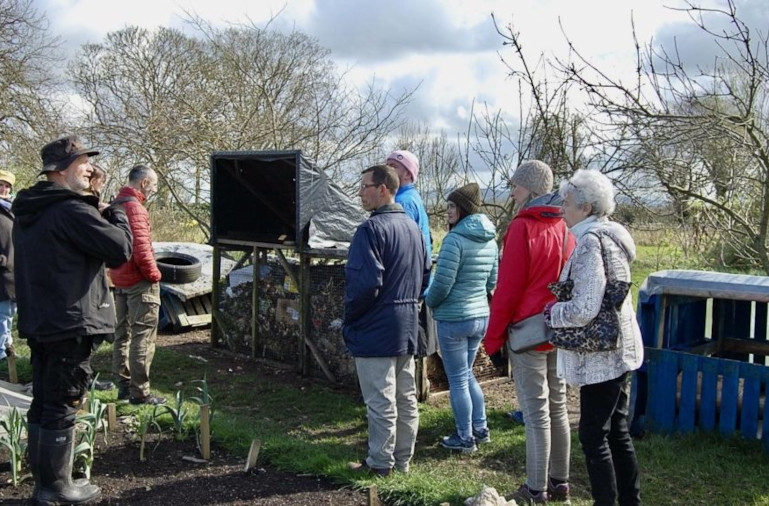This article first appeared on ARC2020.eu. ARC2020 is a platform for agri-food and rural actors working towards better food, farming, and rural policies for Europe.
ARC2020’s Rural Resilience project explores the possibilities for Europe’s territories to become more resilient from the ground up. Building on our 2020-2022 research into initiatives in socio-ecological transition on the ground in France, in 2023-2024 we are looking also to Germany and to the wider Europe to exchange with rural communities that are taking action for resilience.
One of our key focus areas is how to keep food systems in the hands of local communities. As such we were keen to visit Ireland in March 2023 to support the Feeding Ourselves gathering that took place for the 12th year in Cloughjordan Ecovillage.
Alison Brogan shares the rich learnings for rural infrastructure gleaned from this weekend in the Irish midlands.
Background
Ireland’s agri-food sector is an interesting context in which to consider rural resilience. For decades now, Ireland has intensively and successfully pursued specialisation in meat and dairy production for growing export markets, but is a net importer of fruit, vegetables, grains and oil seeds. Much of the sector’s growth is precariously perched on inputs, such as mineral fertilisers, which are resource intensive, pollution causing and subject to inflation.
So while 38% of the country’s greenhouse gas emissions now come from agriculture, the sector is committed to a mandatory 25% emissions reduction by 2030. Ireland’s Environmental Protection Agency (EPA) has repeatedly questioned the sustainability of the massive dairy sector expansion (including in this recent interview with CEO Laura Burke), in particular with regard to rising greenhouse gas emissions and water quality. Meanwhile, biodiversity loss, ammonia pollution, and socio-economic issues continue.
Outside of dairy, there is a distinct lack of economic viability, and, concurrently, power concentration in the hands of processors and a small number of huge farmers, many closely connected to the processors.
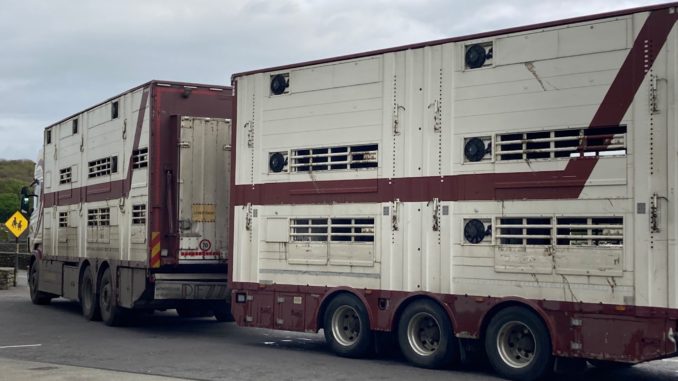
A livestock truck used for transporting pigs. Photo: Alison Brogan
There is a need for, and much talk about, a just transition in agriculture in Ireland. There is less talk of rural Ireland, and where there is, it is often polemic about attacks on, or the death of rural Ireland. This isn’t always helpful.
So is another approach to rural Ireland possible?
Feeding Ourselves is a place where people building – or aspiring to build – islands of resilience through food, farming and rural activities can learn from each other, inspire one another and figure out how to connect these islands of effort.
The event is designed to facilitate community learning and movement building, and we saw this function come to life throughout the weekend. One place it shone through was in the blended session on the Saturday afternoon which connected Cloughjordan to Europe to exchange stories of rural action.
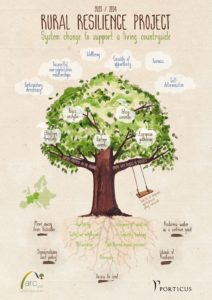 A partner of the Rural Resilience project, Rémi Beslé from Plessé municipality in France, joined two other contributors to the book Rural Europe Takes Action – No More Business as Usual – Mel White from the Open Food Network in Cloughjordan and Ivana Radović from the Balkan Seed Network – to share their stories of rural transformation.
A partner of the Rural Resilience project, Rémi Beslé from Plessé municipality in France, joined two other contributors to the book Rural Europe Takes Action – No More Business as Usual – Mel White from the Open Food Network in Cloughjordan and Ivana Radović from the Balkan Seed Network – to share their stories of rural transformation.
Networking is certainly an important part of the growing movement around the annual Feeding Ourselves event. So too is the physical infrastructure needed to facilitate and enhance the work of the farmers, seedsavers, weavers, bakers, brewers and more, shaping and building this growing movement.
This need to move from networks to frameworks – one of the policy messages of the book – also echoes the findings of the Rural Resilience project on the ground in France. Indeed, several of the focus areas of the project [click the graphic on the left to learn more] were woven into the Feeding Ourselves weekend: democratising food systems, access to land, and islands of resilience (as well as diversification).
Food Hubs
In France, the Rural Resilience project is studying the relevance of Territorial Food Programmes (Plan Alimentaire Territorial, or PAT) as a tool to democratise and re-localise food systems. A state-promoted template to counterbalance export-oriented agriculture, Territorial Food Programmes are implemented to varying effects at local and regional level, but more often than not turn into a box-checking and PR exercise that contributes little in terms of food resilience for communities. In Germany, meanwhile, Food Policy Councils (FPC) are being explored in the biggest cities and towns as a way for populations to regain control over their food, their health and their fate in the face of a changing climate.
It is interesting to compare these mechanisms with food hubs, and digital platforms that enable them, which can help facilitate the aggregation, processing, value addition, distribution and marketing of local food.
In Ireland, the North Tipperary Online Farmer’s Market operates a food hub in the WeCreate Enterprise Centre (the Feeding Ourselves HQ) providing an online platform through the Open Food Network and a physical space for the region’s farmers, craftspeople, artists, bakers and chefs to aggregate and market their products.
Established in Australia in 2015, the Open Food Network is a user-owned open-source platform. It aims to build a public infrastructure for selling and distributing local food. North Tipperary Online Farmers Market has about 20 producers, including a Community Supported Agriculture initiative, local cheese, bread and crafts.
Mel White of North Tipperary Online Farmer’s Market explained how community-owned hubs have a role to play in food sovereignty, allowing communities to keep control of their food and impact the distribution model, but also provide the potential to build in solidarity elements such as social pricing to help promote food equality.
Various barriers to local and agroecologically-produced products persist, and some communities can be somewhat oversupplied with craft and local produce.
But there are ways to overcome these barriers, if the will is there. State funded food vouchers redeemable in food hubs like that of North Tipperary could be introduced to give lower income people access, if they so please.
On overcoming digital barriers, OFN UK provides a good example of how to make online markets inclusive to people without the digital know-how necessary to use the platform: a designated technical support person takes phone orders from customers and lists products for those who need it.
In Cloughjordan, the food hub is a physical space where the market is located and where a cafe operates one day a week. Its organisers are looking to integrate other elements, such as preserving surplus vegetables, adding value to gluts, and selling them. Part of their work is exploring how to feed ourselves better, in ways that can be replicated and scaled. The food hub and online market are a DESIRA living lab so the benefits and costs are fed into EU level policy documents that DESIRA produces.
Food hubs can take different shapes and have different aims. The Drumshanbo Food Hub in county Leitrim is a multi-tenant food production centre, established by a social enterprise in 2004. For almost 20 years this food hub has provided facilities for local food actors to scale up production and value-adding processing. As well as renting food production spaces to tenants, the hub also contains a time-share production facility and a food and hospitality training facility.
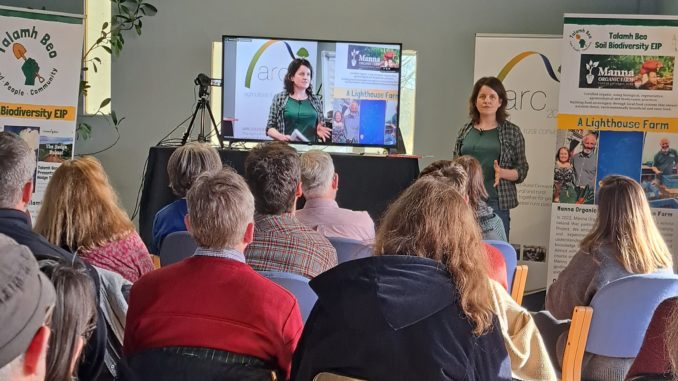
Horticultural farmer Janet Power presents the Talamh Beo Women project at Feeding Ourselves 2023. Photo: Oliver Moore
Processing and distributing agroecological food
Moving from networks to frameworks, from enabling relationships to the physical scaffolding that can contain and bolster them, it’s time to talk about inclusive and resilient rural infrastructure.
Around Europe, the concentration of processing into larger facilities in adherence with the ‘get big or get out’ philosophy has led to the loss of much local and regional infrastructure for milling, slaughtering, textile production and so on.
While there are bakers, butchers, millers and other artisans working hard to keep their crafts alive, support is needed for the reconstruction of regional processing structures such as mills, dairies and slaughterhouses, as well as the establishment of sustainable vocational training across value chains.
This was a point made last year by the Free Bakers, an independent professional organisation of artisan bakers and confectioners, whose BAKWERT project aims to generate regional organic value chains consisting of organic farms, organic mills and organic artisan bakeries, in their contribution to Rural Europe Takes Action – No more business as usual, the policy guide for Rural Europe published by Forum Synergies and ARC2020 in June 2022.
Listening to participants at Feeding Ourselves talk about the need for regional processing units for flax and hemp, or choosing to lose organic certification rather than having to transport their organically reared animals further than they would like for slaughter, it’s clear that Ireland’s agroecological infrastructure also needs a major shake up.
Thanks in no small part to the improved support for organic production in Ireland’s CAP strategic plan, the number of organic farmers has doubled in a year. During a session on diversification, farmer Mimi Crawford pointed out the need for support not just for organic production but for the development of infrastructure for the processing, marketing and distribution of organic food.
Farmers going into organic will end up having to sell their produce conventionally if there is not enough or suitably located organic certified processing infrastructure or market demand. This already happens in livestock and dairy production, and means that farmers lose out on the organic premium.
Alongside suitable production, processing and distribution channels, public procurement policies can be used to increase the market for agroecological products in a region. School canteens and other public institutions can and should be used as anchor institutions to create and maintain steady demand for a region’s offerings produced and processed in environmentally and socially beneficial ways. French partner Rémi, an elected representative and farmer in Plessé, explained that the school canteen policy is to serve 80% locally produced products.
Access to land…
In the Irish context, where mechanisms to support land access for new entrants are underdeveloped and land mobility is low, the insights shared by Rémi into Plessé’s work to safeguard farmland are intriguing.
Rémi gave an insight into the objectives and implementation of the municipality’s local agriculture and food policy or ‘PAAC’, its name a fun and gently subversive play on the French acronym ‘PAC’ which stands for the Common Agricultural Policy.
He explained that France’s SAFER agencies monitor land transfers, and have access to all sales of agricultural land plus the possibility of preventing the purchase of land at unauthorised prices.
In March, the regional SAFER agency preempted the purchase of a 25ha plot which was initially on the market for €3,000/ha, €1,000 more than the average land price in Plessé. Although SAFERs are not without controversies, they are a useful touchstone for other parts of Europe where such mechanisms don’t exist. As Fergal Anderson of Talamh Beo pointed out, in the Irish context, there is a need to harmonise access to land through legal frameworks, to promote access for farmers, especially young entrants, and to prevent speculation.
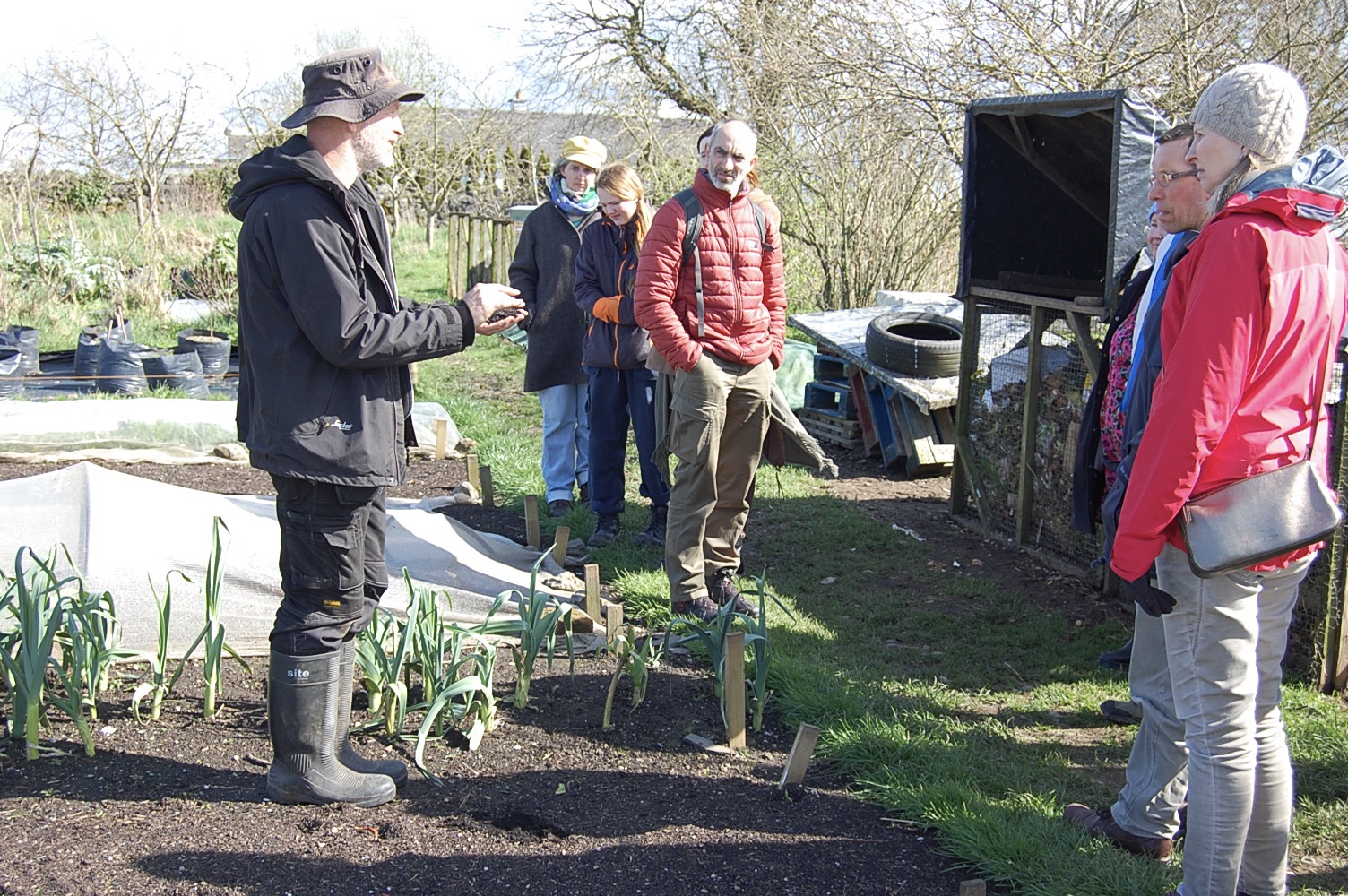
Bruce Darrel explains the community compost system he runs to Feeding Ourselves participants. Over 30 households use the facility following one rule: you can add anything that was recently alive. The most watched video currently on the RED gardens Youtube channel with 1.2 million views is about this One Rule Compost method. Photo: Alison Brogan
…enabling access to food
Sharing skills and knowledge with those eager to learn is an important ingredient that empowers people on the ground to participate in socio-ecological transition.
An impressive example of this community learning aspect is Bruce Darrell’s Research Education and Development – RED – Gardens project in Cloughjordan Ecovillage, which Feeding Ourselves participants could visit before parting ways on the Sunday afternoon.
The purpose of the RED Gardens Project is specifically worded: “to try to get more people to grow more of their own food”. Bruce identifies this as a part of the shift towards more sustainable and resilient food systems.
Through his Youtube channel, Bruce shares educational videos based on his investigation and experimentation into six different food growing philosophies on six 100m2 plots. He educates and empowers a global audience of people interested in growing food with digestible and well-produced videos, while also growing more food elsewhere on the ecovillage site.
Bruce gets to do this work because he was able to access land where he lives, on the 67 acres of Cloughjordan Ecovillage. Places like ecovillages can become living labs, concentrated hubs of action and experimentation, giving options and opportunities to people.
Bridging islands of resilience
Connecting with inspiring communities locally, nationally and internationally can be a pathway to learning new ways of doing – and thinking about – things. More than highlighting cases of good practice, network building like this can help foster knowledge co-creation and consolidate a collective response to global food system pressures, as Alison Blay-Palmer and colleagues propose in this study.
The power of networks, both formal ones like the Feeding Ourselves Network which provides a platform for communication and peer support between diverse organisations, and informal networks like those between farmers, millers, brewers and bakers working together in regional value chains, came up several times over the course of the gathering in Cloughjordan.
Although there is no cookie-cutter template for socio-ecological transition, it’s important to build bridges between communities working for fair food systems and resilient rural areas around and beyond Europe. What works in one context may not work in another, but there is something to learn from like – and unlike – minded groups and individuals, be they 10, 1,000 or 10,000 kilometres away.
In 2023-2024, the Rural Resilience project embarks on a new phase of joining the policy dots while continuing to nurture what we have built together, and widening the lens from France to Germany and the broader Europe. To learn more, visit the project page, and follow ARC2020 on LinkedIn , Twitter, Facebook or Instagram.
Return to the Rural Resilience project page


